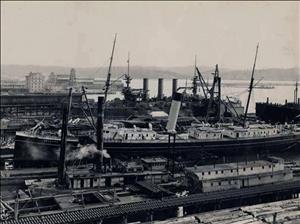On April 6, 1917, the U.S. Congress declares war on Germany after that government resumes unrestricted submarine warfare. Great Britain, France, Italy, and Russia have been at war with Germany and Austro-Hungarian Empire since August 1914. The declaration of war triggers a wave of patriotic feeling across the country and hundreds of thousands of men volunteer for military service. Civilian women and men sign up for duty with the American Red Cross and with community defense organizations. The state of Washington, particularly Seattle, will experience an economic boom. Camp Lewis near Tacoma will grow to a major military post of 40,000.
Although the U.S. was officially neutral in the European war, arms, munitions, and other strategic materials flowed across the Atlantic to Great Britain from the Americas. The German government, cut off from its own overseas sources of raw materials, announced that it would attempt to sink any vessels, even those of neutral powers, found within the war zone. This put American ships directly at risk and President Woodrow Wilson asked Congress for the declaration of war.
At the University of Washington, 600 men, 30 percent of the student body, enlisted. To show his patriotism, UW President Henry Suzzallo removed the head of the German Department, Professor F. W. Meisnest, because the scholar had, several months before, given a speech opposing the U.S. entry into the war. Suzzallo asked the U.S. Secret Service to "watch all men in the German Department and all members of German birth or descent" (Berner, 246).
A vigilante group of businessmen and professionals calling themselves the Minute Men and enjoying the endorsements of Seattle Mayor Hiram Gill and the police chief organized to suppress efforts to embarrass the government in prosecuting the war. (They considered dissent to be unpatriotic. Others would term their efforts to suppress dissent war hysteria.) They focused their attention on pacifists, labor leaders, and political radicals. The Minute Men secured the dismissal of six teachers for failing to impress patriotism on their students as required by the school code.
Even before the Congressional action, Seattle received military orders for ships, which added two new shipyards to the waterfront. Tacoma also benefited from military contracts and the sprawling training reservation named Camp Lewis. The Navy built a training camp on the campus of the University of Washington. Thousands of new war workers crammed into Seattle and Tacoma, which raised rents and helped labor unions press for higher wages. Workers in a wide range of sectors, from logging to metal trades to crackers and candy, struck for pay increases.

